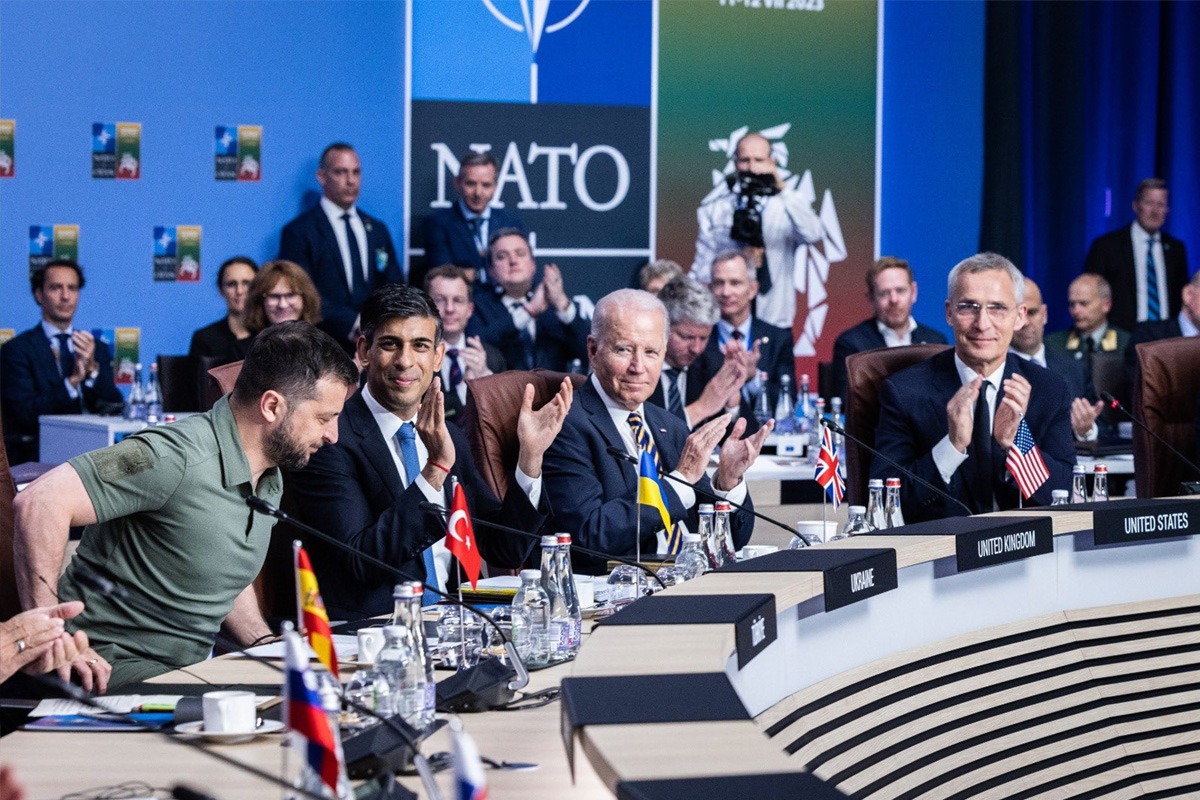

As Ukraine’s counteroffensive struggles, Western corporations have moved in to ensure Ukrainian assets are in their control when the nation falls.

The recently-concluded NATO summit at Lithuania’s Vilnius could well be the start of a subtler rehash of the end of World Wars – when Europe witnessed substantial changes in its map with the creation of Poland or Turkey, or when Germany ceded territories to Poland and the USSR. Only this time it seemed as if NATO, stalled by the Russian special military operation and fast losing hopes from the fabled Ukrainian ‘counteroffensive’, is looking to redistribute parts of western Ukraine among its member countries.
But before we jump to this conclusion, let’s have a relook at some interesting events that have unfolded in recent months. Rheinmetall, the 135-year old German arms manufacturing company, has said that it is opening an armoured vehicle plant in western Ukraine at an undisclosed location in the next twelve weeks – one that would not be susceptible to Russian air attacks, unlike the destroyed Ukrainian arms factories. Germany has also become the second-largest arms supplier to Ukraine – both in terms of supplied wares and in terms of proposed allocation (the plan hovers around the 10 billion Euro mark). That aside, Germany also appeals for ‘understanding’ the US decision to supply Ukraine with cluster ammunition which is banned by the UN. To put it concisely, the suspicion is that Germany is out to create some equity in Ukraine (whatever remains of it) before Poland does.
With Ukraine looking poised to permanently lose its eastern areas to Russia, Germany expects Poland to pounce on territories it had to cede for the formation of Ukraine last century. In this gigantic geographical game of territorial musical chairs, NATO members are readying their narrative for when the time comes.
ALSO READ: Why UCC drafting committee should collaborate with Saudi Arabia
But geography aside, when the dust settles, who remains the real in-charge of Ukraine? You can trust the transnational corporations for that! While Germany or Poland might end up fighting among themselves for decorating their maps with added territories, it is the foundations and the asset management companies that would control their output. 28 per cent of Ukrainian arable land (9 million hectares) are controlled by their oligarchs or directly by the Western interests. They include sovereign funds, pension funds, university endowments, and foundations – invested through a US-based private equity fund, NCH Capital. Among the recent big-boys, several names like Vanguard, Kopernik or BNP have now walked in to control these oligarchs through controlling their assets and shares – in short, their entire businesses.
The war in Ukraine rages on; Russia keeps nibbling at Eastern Ukraine, Ukrainians leave their country by millions, and unlucky thousands get physically forced to the battlefront by their glorious leader. The media houses that act as the mouthpieces of Western propaganda celebrate the supply of newer and newer weapons to Ukraine – touting each shipment as that part of the missing puzzle that is destined to liquidate the entire Russian Federation.
You would hear no one talking about the cost. With Ukrainian farmlands gone, the Western finances to Ukraine (which went on a booster dose after the start of the Russian SMO) have come with a structural adjustment program that mandates austerity and further privatization measures. Time Magazine’s 2022 ‘Man of the Year’ Zelensky had initiated this a few years ago against the will of the majority of Ukrainians. It has not only aggravated corruption, but has left small farmers with no money, no resource, and no support, as the big landowners have ceded control to their Western masters. With conditions worsening, most of the small farmers must have sold their properties to the BNPs and Vanguards of this world and have left, hiding among the millions that are now flooding the rest of Europe. [For more details, read War and Theft: The Takeover of Ukraine’s Agricultural Land, a report by the Oakland Institute.]
ALSO READ: India expects BrahMos missile orders from Russia
About a month before the Russian SMO started, a friend and I, appearing for a podcast, had predicted that Ukraine would suffer the same fate as Iraq and Afghanistan. With West’s financial vultures tearing into Ukrainian resources, it looks like the Iraq phase has begun. A war produces serious debt issues. The Oakland Institute Report suggests, “Ukraine’s crippling debt is being used as a leverage by the financial institutions to drive post-war reconstruction towards further privatization and liberalization reforms in several sectors, including agriculture.” That reminds one of the US-designed Iraqi ‘restructuring’ program, that, other than making millions for contractors like Halliburton or Bechtel, killed hundreds and thousands of Iraqis, birthed ISIS, and pushed Iraq into the influence zone of Shia Iran.
Vladimir Putin did not expect the Ukrainians to put up the kind of resistance they did, when his troops walked into Ukraine. Russia thus had to make adjustments on the move and reshape their war objectives. One of the objectives was to secure the breakaway Russian speaking provinces. The West too, did not expect Russia to occupy the eastern provinces. Now that it looks like Russian forces would not be dislodged so easily – with erstwhile Ukrainian territories now a permanent part of the Russian Federation – they are making adjustments too. Having sold billions of dollars of inferior weaponry, the NATO countries have moved to securing the control of the future profits. All along, they have kept Ukraine’s NATO membership hope hanging expectantly if only to prevent the leftover Ukrainians from toppling the Zelensky regime.
The recent NATO summit was probably a reinforcement of that.
(Arindam Mukherjee is a geopolitical analyst and the author of JourneyDog Tales, The Puppeteer, and A Matter of Greed.)
Views expressed are the author’s own.